|
|
|
Sort Order |
|
|
|
Items / Page
|
|
|
|
|
|
|
| Srl | Item |
| 1 |
ID:
128987
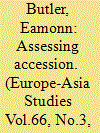

|
|
|
|
|
| Publication |
2014.
|
| Summary/Abstract |
On 1 May 2014, the European Union (EU) celebrated the tenth anniversary of the accession of ten member states-Cyprus, Czech Republic, Estonia, Hungary, Latvia, Lithuania, Malta, Poland, Slovakia and Slovenia. Of these ten new members, eight were Central and East European (CEE) countries that had, for most of the twentieth century, been governed by communist regimes either as republics of the Soviet Union (Latvia, Lithuania and Estonia), satellite states of the Soviet Union (Poland, Hungary, Czech Republic, Slovakia) or as a constituent republic of Yugoslavia (Slovenia). In the subsequent ten years three additional post-communist countries have acceded to the EU (Romania and Bulgaria in 2007 and Croatia in 2013). Commenting on the 2004 EU accession of the first eight former communist countries, the then Irish Prime Minister and President of the European Council, Bertie Ahern, wrote that there was
a particular historical resonance as eight of the former communist countries in the east have emerged from the shadows of the Iron Curtain to join us in working for common goals and for mutual benefit. The artificial divisions, which have blighted our continent's history for so long, are finally being laid to rest.1
|
|
|
|
|
|
|
|
|
|
|
|
|
|
|
|
| 2 |
ID:
152223
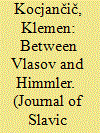

|
|
|
|
|
| Summary/Abstract |
The aim of the article is to present the little-known Russian (Soviet) military unit that fought on the German side during the Second World War. Origins of this regiment go back to the Wrangel’s émigré army in the Kingdom of Yugoslavia, which provided the cadre for the future unit, working for the Germans against their old enemy — communists. First established as auxiliary police in Serbia, personnel were then sent to the Eastern front to perform commando-style actions in the Soviet hinterland. With the collapse of the German might, this unit was sent to Slovenia, reformed as a regiment, and used in warfare against local partisans.
|
|
|
|
|
|
|
|
|
|
|
|
|
|
|
|
| 3 |
ID:
086962
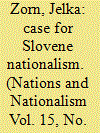

|
|
|
|
|
| Publication |
2009.
|
| Summary/Abstract |
When Slovenia became a sovereign state in 1991, it had to define who its citizens were. Were all residents of Slovenia, regardless of their ethnic belonging, equal in this respect? This article provides an answer to this question by elucidating certain parts of the secession legislation - the initial designation of citizenry and one of its indirect outcomes, the erasure from the register of permanent residents. The ethnic/civic dichotomy will be applied in order to demonstrate opposing nationalist claims made by the ruling elite. In terms of specific processes, Slovene nationalism will be presented in three distinct phases: counter-state nationalism (before the break-up of Yugoslavia), state-building nationalism (the initial designation of citizenry), and the nationalising state (after the secession; marked by the erasure and threats to revoke citizenship statuses of naturalised citizens).
|
|
|
|
|
|
|
|
|
|
|
|
|
|
|
|
| 4 |
ID:
112394
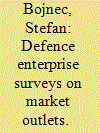

|
|
|
|
|
| Publication |
2012.
|
| Summary/Abstract |
This article presents the results of an empirical survey of Slovenian defence enterprises focusing on three segmented geographic market outlets: the domestic market, the other European Union (EU-26) markets and the global markets. In the enterprise surveys are included around two-thirds of the domestic defence enterprises of different sizes and activities. The Slovenian defence enterprises by production, supply-in-return, subcontracting, middleman and trader activities in the defence marketing chains are mostly specializing towards the businesses on the domestic market. Rare enterprises are specialized exclusively for activities on the EU-26 markets and the global markets.
|
|
|
|
|
|
|
|
|
|
|
|
|
|
|
|
| 5 |
ID:
119614
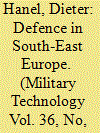

|
|
|
|
|
| Publication |
2012.
|
| Summary/Abstract |
After the collapes of Soviet Union in 1991, the disintegration of Yugoslavia in 2002, and EU and NATO enlargement, South-East Europe became a region characterised by fundamental political, economic and military change.
|
|
|
|
|
|
|
|
|
|
|
|
|
|
|
|
| 6 |
ID:
091596
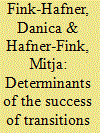

|
|
|
|
|
| Publication |
2009.
|
| Summary/Abstract |
The article provides an analysis of the determinants of the success of transitions to democracy based on a combination of qualitative comparative analysis of Poland, the Czech Republic, Slovakia, Hungary, Slovenia, Croatia, Bosnia & Herzegovina, Serbia, Montenegro and Macedonia; and hierarchical clustering. The key finding is that one can reveal configurations of several factors which jointly determine either continuous or disrupted transitions to democracy.
|
|
|
|
|
|
|
|
|
|
|
|
|
|
|
|
| 7 |
ID:
118428
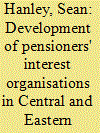

|
|
|
|
|
| Publication |
2013.
|
| Summary/Abstract |
Studies of organised interests in Central and Eastern Europe have overlooked constituencies shaped by the welfare state such as retired people. The article compares the development, structure and strategies of pensioners' interest organisations in the Czech Republic and Slovenia. It finds that sizeable, if poorly resourced, membership-based pensioners' interest organisations have emerged, largely independently of trade unions, and integrated into interest representation systems. Although lack of resources and organisational problems hamper lobbying capacity, these groups retain mobilisation potential. Comparison suggests that legacies and modes of transition still shape pensioners' interest organisations more than institutional structures or new population ageing strategies.
|
|
|
|
|
|
|
|
|
|
|
|
|
|
|
|
| 8 |
ID:
089559
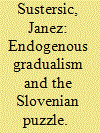

|
|
|
|
|
| Publication |
2009.
|
| Summary/Abstract |
We use EBRD transition index to classify transition countries into gradualist and orthodox reformers. When comparing this classification with records of economic and political reforms before the breakdown of socialism, an apparent historical regularity emerges. Countries where transition was to an extent »endogenous« were more likely to choose a gradualist strategy, whereas countries where a strict socialist regime was upheld until its breakdown, were more likely to decide for an orthodox »big-bang« approach to transition. Some political economy explanations for this regularity are suggested.
|
|
|
|
|
|
|
|
|
|
|
|
|
|
|
|
| 9 |
ID:
023430
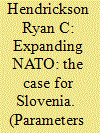

|
|
|
|
|
| Publication |
Winter 2002-03.
|
| Description |
64-76
|
|
|
|
|
|
|
|
|
|
|
|
|
|
|
|
| 10 |
ID:
151308
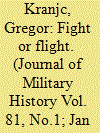

|
|
|
|
|
| Summary/Abstract |
As Slovenes were the only people to be annexed by three occupiers during World War II—Italy, Germany, and Hungary—the work offers a unique comparison of Axis policies on conscripting occupied populations and combatting desertion and draft-dodging. In Slovenia’s fratricidal guerilla war between the native Communist-led resistance, the Liberation Front, and Axis-sponsored Slovene military collaborators, these irregular units also competed to enlist men of fighting age and struggled to keep them from leaving. An examination of the motives behind the men’s decisions not to fight reveals that the rallying cry of “national duty” was often trumped by more parochial and individual concerns.
|
|
|
|
|
|
|
|
|
|
|
|
|
|
|
|
| 11 |
ID:
101806
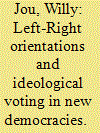

|
|
|
|
|
| Publication |
2011.
|
| Summary/Abstract |
The left-right schema encapsulates major political cleavages and constitutes an important link between voters and parties. Using election surveys in Slovenia covering the period 1992-2004, this study examines the anchoring of left-right orientations by social structure and party preference in Slovenia in comparison with other Central and Western European countries, and discusses differences in levels of ideological voting according to political sophistication, closeness to parties, support for the democratic process, perception of party system polarisation and preferred party. Results show that left-right orientations in post-communist societies are more anchored in partisanship than class and religion, and that higher education and perception of greater party system polarisation are associated with increased ideological voting.
|
|
|
|
|
|
|
|
|
|
|
|
|
|
|
|
| 12 |
ID:
122953
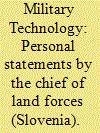

|
|
|
|
|
| Summary/Abstract |
The chief of land forces (Slovenia) in the member of representative counties detail the reform processes through which their services are adapting their respective structures, equipment and doctrines to the new requirements of our times. The army of the Slovenia Armed Forces
|
|
|
|
|
|
|
|
|
|
|
|
|
|
|
|
| 13 |
ID:
124343
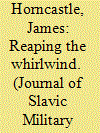

|
|
|
|
|
| Publication |
2013.
|
| Summary/Abstract |
On 25 June 1991 Slovenia declared independence from Yugoslavia. Most outside observers assumed that the federal army, the Yugoslav People's Army (YPA), would quickly reassert federal authority over Slovenia. Instead, Slovenia not only defeated the YPA, but would gain the initiative against the mechanically superior force. This article will argue that one of the principle reasons for Slovenia obtaining independence was that it benefited from the military heritage of the Yugoslav defense policy of Total National Defense (TND), whereas the YPA was largely inhibited by its legacies.
|
|
|
|
|
|
|
|
|
|
|
|
|
|
|
|
| 14 |
ID:
061098
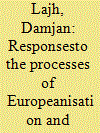

|
|
|
|
|
| Publication |
Winter 2004-05.
|
|
|
|
|
|
|
|
|
|
|
|
|
|
|
|
| 15 |
ID:
114174
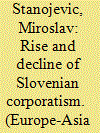

|
|
|
|
|
| Publication |
2012.
|
| Summary/Abstract |
In the 1990s a regulative pattern that strongly mirrored the structure and basic functions of post-war European corporatism was formed and stabilised in Slovenia. The system enabled the country's relatively fast and smooth inclusion in the European monetary system. However, its former rise and recent tendency towards disorganisation clearly overlap with the qualitatively different phases of Europeanisation. At first glance, this overlap supports the thesis that there has been a decline of corporatist pacts in the post-EMU period, suggesting that the decline is caused by the more or less successful internalisation of EMU demands and pressures during the accommodation process. In the Slovenian case, this interpretation is basically misleading. It is true that the decline of corporatism in Slovenia was connected with EMU pressures, but the primary source of its disorganisation lay in its specific micro-foundations.
|
|
|
|
|
|
|
|
|
|
|
|
|
|
|
|
| 16 |
ID:
125116
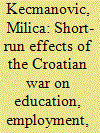

|
|
|
|
|
| Publication |
2013.
|
| Summary/Abstract |
The recent war in Croatia (1991-1995) has had numerous adverse affects on the country and the economy as a whole. This article investigates the effect that the war had on the educational, employment, and earnings trajectories of the 1971 birth cohort of men. This birth cohort was very likely to be drafted into the armed forces. Using data from the Croatian and Slovenian Labour Force Surveys, the author treats the occurrence of the war as a natural experiment and applies the difference-in-difference framework to compare this cohort to adjacent cohorts, women, and respective cohorts in Slovenia, a neighboring country that did not experience war. The war appears to have had a negative effect on educational outcomes but a small positive effect on employment and earnings outcomes of this cohort of men. Croatia's victory in the war may provide an explanation for the observed preferential treatment of draftees in the labor market.
|
|
|
|
|
|
|
|
|
|
|
|
|
|
|
|
| 17 |
ID:
109017
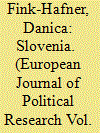

|
|
|
| 18 |
ID:
100110
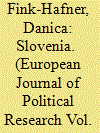

|
|
|
| 19 |
ID:
144189
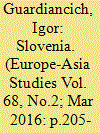

|
|
|
|
|
| Summary/Abstract |
During the Great Recession, Slovenia recorded one of the worst economic performances within the EU. Such a decline is surprising as the country was the most stable among the post-socialist states. The article individuates the root cause for the downfall in protracted reform gradualism, which resulted in an inefficient privatisation process. This locked the country into a ‘partial reform equilibrium’ where economic elites extracted rents. Following accession to the EU, the unsustainable lending practices of state-owned banks to corporate organisations and the gridlock in policymaking pushed the country into an economic and political ‘bad equilibrium’. Even though the Slovenian export sector proved to be surprisingly resilient, a massive debt overhang and a huge reform backlog are still weighing down on a healthy recovery.
|
|
|
|
|
|
|
|
|
|
|
|
|
|
|
|
| 20 |
ID:
008941
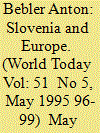

|
|
|
|
|
| Publication |
May 1995.
|
| Description |
96-99
|
|
|
|
|
|
|
|
|
|
|
|
|
|
|
|
|
|
|
|
|